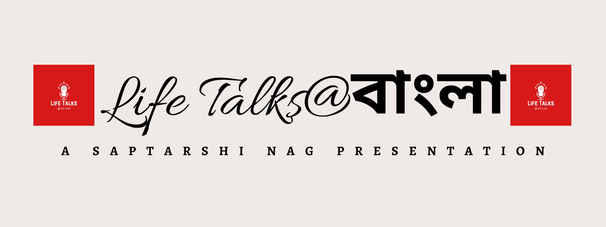
One of the essential components of the traditional Bengali cultural plurality is the way the Birth Anniversary of Rabindranath Tagore is celebrated all across the state. Fondly it is called the Rabindra Jayanti when the Bengalis sing, dance and recite to the mellifluous creative works of the great bard. In a way, it is practically the cultural initiation for most of the Bengalis in the early stages of their lives. It is the occasion when the Bengalis get their first taste of being on stage. It is the day when many of us actually faced the audience for the first time, irrespective of the magnitude of the galore. For some, it remains the catapult for the rest of their lives and they pursue careers in the foot-marks of the great creator while many choose different paths. But the impacts of Rabindra Jayanti in their respective lives are undeniable.
I fondly remember my childhood memories with this day. My first recitation in front of people other than my parents was on the same occasion. While I was hesitating to face the crowd gathered in our small lane for the function, I was being constantly pushed by my enthusiast mother to move ahead and recite. Unfortunately, I ended up running away without even completing the poem. In the first place, I could not remember the lines and secondly, I was too nervous to even recall those seeing all my friends, seniors, uncles, and aunts around. Things got messed up. It has been three long decades since then. Still, I so affectionately recall that little story as it was the first platform for a kid like me to perform. It was truly an august congregation of all the familiar people of the mohalla. Thanks to the Kaviguru.
This year, on the same occasion, I attended a same programme in a different place, in a different city. By then, I was already established in my own little way and that earned me the chair of the Chief Guest of the ceremony. I was expecting lots of young Turks of the mohalla to come up, dressed in traditional Bengali attire, all set for showcasing their talents on the creations of the venerated Gurudev. To my surprise and disappointment, unlike my first exposure to this occasion thirty years back, the crowd this time was thinner. And to top it all, this time the composition of the crowd varied too, as instead of a heterogeneous crowd comprising of people of all ages, the sparse audience was full of senile people. The zeal was dying. The spark was missing. And the glory was past. After introductions and felicitations and speeches (that alone consumed an hour almost), the master of the ceremony proudly announced the list of performances coming up next. The list was encumbered with serious things with a clear motive of ostentation of the intellectual capacity of the organizers and performers. The highlight of the evening as the announcer boasted of was a discussion on Gurudev’s ideas of the Russian Revolution of 1917. I was about to fall from the chair. The cherry on the cake was a rap group’s fusion on Tagore songs. While the first one harpooned my ship; the second one definitely turned it upside down. I could not lament on the thin attendance as the anchor himself said that while the discussion on Russian Revolution was a food for thought for the people with grey cells, the fusion was a crowd puller with an infinite appeal to bring in the younger generation (as if they do not have any grey cells). I left the programme soon, with a heavy heart and a feeling ‘Those were the days’. In an effort to wear a garb of intellectualism, we have lost the innocence underneath.
The two stories reflect a comparative take on the dying state of the cultural richness, I was boasting of initially. In an effort to ape the cosmopolitan effect that is consuming the whole country, the plurality is sadly replaced by the singularity of modernism, so much so that the basic ingredients of our very existence are on the wane. Please do not get me wrong. I do not have anything against any form of modernism. But any effort to become modern, without giving the basic values of life their due respect is sure to rot someday. Add to it the fervent desire to become intellectual. And the resultant is a sorry state of affairs of the people whose forefather once were the scions of the nation.
The modern tools of consumerism have much to do with this. I recall one incident that took place in the playground I regularly visit for practicing cricket. We did not have enough fielders to cover the whole ground. Once the ball reached the fence, we shouted to two young kids, sitting at the boundary line and busy with their phones, to throw the ball. They were students and the bags they were carrying gave me the impression that they had bunked their tuition. However, instead of giving the ball, they remained glued to the phones. Sadly, one elderly person who was enjoying his morning walk came forward and threw the ball. I assumed those kids were clicking some selfies to post on the social networking sites to attract likes and comments. Rabindra Jayanti too has become an object to be liked and commented on the networking sites. On this day, you may notice the pages are being flooded with posts to display a tribute to the poem. You may come upon some shared poems which the person sharing might not have gone through himself! But that is a definite tool to highlight the fact that you are a connoisseur of art and belong to the upper echelon of the society, inhabited by the intellectuals. The excitement of performing on the Rabindra Jayanti is thus taken away by the jubilation to see more and more likes in your ‘shared’ post (wish those were originals!) on your social networking site. The innocence and simple pleasures of doing real acts like performing a song, a dance or a recitation or even sitting in the crowd to cheer for the next-door kid to encourage him are gone. Tagore is happily residing in social networks. And of course in the selfies taken beside a Tagore bust. After all ‘A selfie with Tagore’ is so cool! And in the rat race of ‘ cool’ and ‘hot’ in the virtual world, it is the warmth this occasion used to bring among ourselves, our lives or the lives of our neighbors is the loser. Let the get-togethers on the Rabindra Jayanti of the earlier days be forgotten forever, let the bonding it used to create once, die its natural death, let the simple joy of enjoying a day with the near and dear ones to pay tribute to the great poet kill itself. All hail the social networks! And let’s celebrate a virtual Rabindra Jayanti in the world of likes, shares, and comments. Oops, I missed tagging!










This article so beautifully portraits how Throughout the years our emotions took turns regarding the Rabindrajayanti. Well, this turn is sloppy, indeed. Sometimes I feel that in search of a modern version if everything we are letting our roots die.
I found this writing extremely engaging and I have also found similarities with my thoughts too. Thank you so much Sir for letting us read this one. Thank you so much.